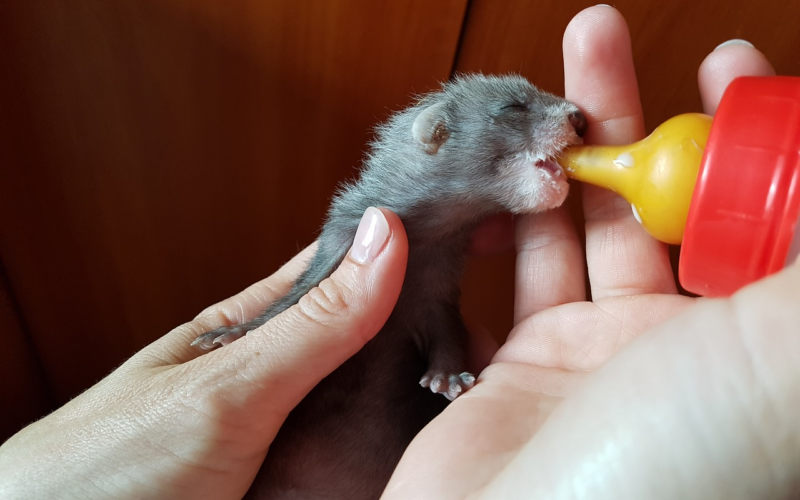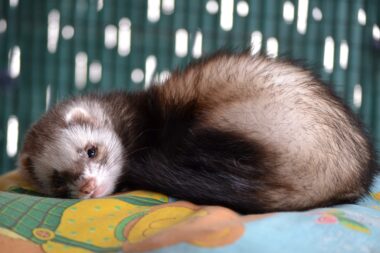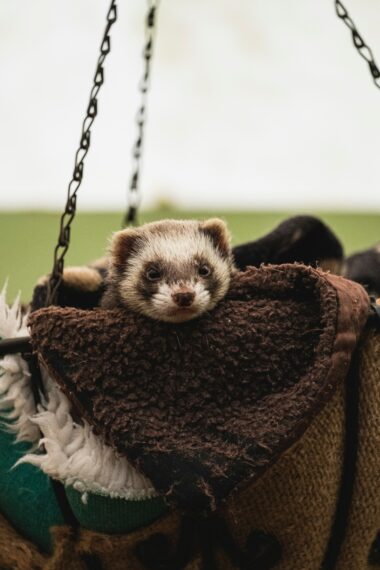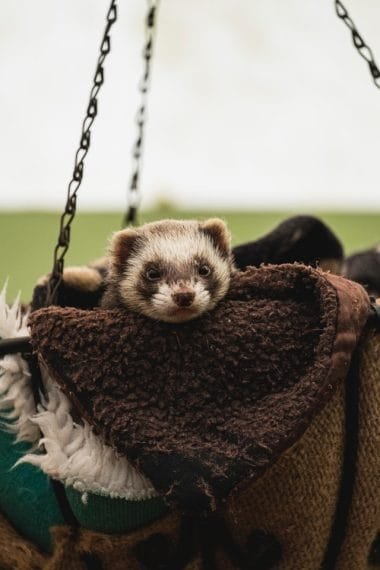The first and most important thing you should do to save an abandoned baby ferret’s life is take it to an experienced veterinarian. He or she can give your kit, as baby ferrets are called, any necessary medications and show you exactly how to care for it. They may even find you a nursing mother ferret, or a jill, who will take care of it. If this isn’t an option, keep reading to find out how you can do your best for these sweet animals.
Why are baby ferrets so difficult to care for?
Ferret kits are incredibly vulnerable at birth. They do not have teeth and their eyes and ears are firmly closed so they are deaf and blind. They even require their mothers’ help to defecate. They cannot consume any food other than ferrets’ milk until at least 3 weeks of age. To make things even more complicated, it is difficult to hand-feed ferrets less than 1-2 weeks of age and nearly impossible to do so for newborn ferrets.
How can I keep my baby ferret comfortable?
Even if you decide to let your ferret roam free when it is an adult, it’s a good idea to keep it in an enclosure when it is a baby. This is for its own protection, as ferrets are very mischievous and can get into all kinds of trouble.
Your enclosure should be large and contain comfortable surfaces for the kit to rest. As it gets older, add in a litter box, a feeding station and structures that will allow it to play and exercise. The enclosure should always be kept in a sheltered and well-ventilated space.
Baby ferrets are very sensitive to temperature and humidity, they may refuse to eat or do anything else until they are comfortable. Keep a warmer or heating pad inside their enclosure. But make sure there is a portion of the enclosure away from the heat source so your kit can get away from it if it gets too hot. In the winter, use a humidifier to keep the environment moist, your kit’s sensitive skin could otherwise get dry and itchy.
The floor of the cage should be lined with newspaper or wood shavings and you must provide a soft sleeping surface. Shredded paper and high quality hay can be used for this, but a soft towel or cloth is the most comfortable and hygienic option. This bedding should be changed or washed with gentle detergents regularly.
What should I feed my baby ferret?
As we said earlier, it would be ideal to find a foster mother to nurse your abandoned kit. If this is not possible, ask your veterinarian or local pet store for ferret replacement milk. If this isn’t available either, mix 3 parts puppy milk replacement with one part whipping cream to make an acceptable substitute. Never try to use cow’s milk instead, it doesn’t contain the right nutrients for your animal and can severely stunt its growth.
Offer your ferret this milk at least four times a day in a dropper, preferably even more often. Remember, baby animals should never go hungry. You’ll probably also need to wake up in the middle of the night for feedings, so prepare yourself for some lost sleep!
You can start introducing semi-solid food into your ferret’s diet at about 3 weeks of age when their baby teeth start coming in. Don’t start weaning them off milk until they are 6-8 weeks old, though. Ferrets are strict carnivores, so you should start giving them meat very early on. They do not need any fruits, vegetables or grains at all but have fast metabolisms which require lots of fat to function properly.
An ideal diet for your baby ferret would consist of store-bought ferret kibble and tiny pieces of boiled meat, both soaked in broth or warm water to soften them. When shopping for kibble, try to find something high-quality. Cheaper brands often use significant amounts of plant protein instead of meat protein, which can be harmful or even lethal for your pet.
If you can’t find ferret food, some kinds of kitten food may be an acceptable substitute. However, puppy food is strictly off limits because it contains too much plant material.
When your ferret first begins to eat this solid food, it will probably be very clumsy and end up getting more food on its body than in its mouth. Mother ferrets will usually lick away the mess, but you can simply wipe your orphan clean with a tissue paper.
By 8-10 weeks old, their sharp adult teeth will begin to grow and you can start introducing harder foods into their diet.
Does my ferret need help to go to the bathroom?
Very young ferrets cannot excrete on their own so their mothers help them do so by grooming their genital area vigorously. You can simulate this by gently rubbing the area with a damp paper towel or washcloth after feedings.
After two weeks of age, the kit will be able to excrete by itself so this is a good time to begin litter-training. Recessed litter trays are best as they allow the kit to walk into them easily and minimize mess. Keep a little bit of its excreta inside the litter box so that your kit can follow the smell and know where to do its business.
When should I start socializing my kit?
You can begin socializing your ferret as early as 30 days old. They will still be partially blind at this stage but can learn that humans are friendly, harmless and helpful. Set up a schedule for handling them. It’s best to set up at least 6 “socializing sessions” per day of 5-10 minutes each to get the animal used to human touch. If they nip at you, hold them by the scruff gently and firmly, say “No.” Physical punishment is completely unnecessary and soon enough, your kit will be getting along very well with everyone.
Kits like being lightly petted, scratched and tickled. Picking them up will be particularly easy when they are sleeping: lift them with one hand supporting the belly and gently place them on your arm or another surface.
For the safety of everyone involved, don’t let very young children handle ferrets, even ones that have been socialized. The child may squeeze the animal too tight or otherwise hurt it, causing it to lash out by scratching or biting.
How can I play with my baby ferret?
Ferrets are playful and active animals! You can place PVC pipes, ladders, hammocks and little igloos in your kit’s enclosure so that they can amuse themselves and exercise even when you are away.
More importantly, though, you need to take them out of the enclosure at least twice a day to play with them. Cat toys that are sturdy enough to withstand their sharp teeth and nails are a good choice and are easily available. Some baby toys and rattles can also be fun!
Avoid squishy foam toys and squeaky rubber ones as your ferret is very likely to swallow them. It’s best not to leave the toys in the enclosure unsupervised for the same reason.
How can I keep my kit healthy?
If you were able to take your abandoned ferret to the vet when you first found it, you would have been informed of any infectious diseases or birth defects it carries. Otherwise, schedule a check-up as soon as possible. In addition, your ferret will probably need to take vaccines for rabies and other diseases.
The animals are particularly prone to diarrhea caused by parasites, bacteria and viruses. These can be treated with antibiotics and other medicines and, of course, careful nursing and plenty of rest.
Young kits can also suffer from respiratory infections like colds and pneumonia, usually caused by bacteria. However, they are also the only pets that can catch the human influenza virus, so make sure you stay away from them if you have the flu.
Fleas, mites and parasites are also common, so make sure you or your vet regularly check for these. They must be treated with appropriate medicines, not DIY-solutions.
From the age of 4 months, it is recommended that you spay or neuter your ferret. This is important not only to stop them from reproducing but also for their health and your convenience. Neutering a male will reduce his urine and body odour once he matures. It will also make it less likely that he marks his territory by urinating all over your home. Spaying also reduces a female’s scent. But more importantly, it reduces the likelihood of the ferret developing severe and lethal anemia, a potential result of an unspayed animal going into heat but not breeding.
Looking after any abandoned baby animal is a huge responsibility, but that certainly doesn’t mean it’s impossible. With enough time, dedication and knowledge, you’ll soon have a happy, healthy ferret in your hands. And remember, when in doubt, always talk to a medical professional!







